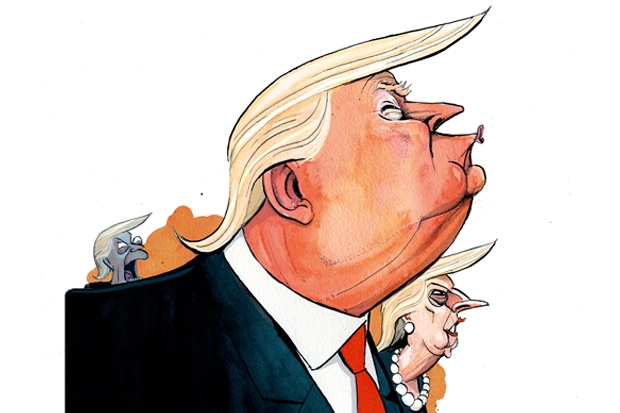On this week’s podcast, we discuss the ‘new normal’ that’s emerged in world politics, how Trump’s election went down in Moscow, and whether dating apps are ruining your chances of finding love.
First up, Rod Liddle and Nick Cohen go toe to toe on the issue of the right’s resurgence and what Donald Trump’s election means for America’s place in the world. In this week’s magazine, Rod argues that there’s been an enormous paradigm shift in global politics, whilst Nick laments the failure of the right to pass the moral test being set by events. On the podcast, they clash particularly on Russia, with Rod claiming that:
“The one thing that made me relieved on election morning, after I’d discovered that Trump had won – because not much made me relieved to be honest – was the thought that, at least, the ludicrous hyperbole and rhetoric against Russia would be toned down a little bit. I know who Britain’s enemies are in the world and Russia doesn’t figure in the Top 50.”
To which Nick responds:
“Well, that’s a remarkable achievement, perhaps you should be running our security. We have interests in the world, we have interests in a democratic and peaceful Europe. Russia has invaded a European country and annexed its territory. I was in the Baltic states the other week: people are scared witless by Russia and they’re scared witless by Trump. Perhaps they’re all being hysterical as Rod pretends.”
Donald Trump’s rise to the Presidency of the United States has been greeted by euphoria in Russia, where he is seen as a man in the mould of their own leader, Vladimir Putin. Owen Matthews was there for election day and spent the preceding week doing the rounds on Russian state TV, valiantly defending the West. He joined us from Moscow to discuss how the new political landscape looks from the Russian capital.
“Not only was I in Moscow [for election night] but I found myself invited to an election night party thrown by a rather odd collection of Muscovite Trump supporters, which was an extremely strange experience. Russia has been rooting for Trump through this whole election, for reasons which are not entirely clear, but there are a contingent of people, Russians and foreigners alike, who see Vladimir Putin as a sort of Che Guevara figure for the Alt-Right. It was people like this who were gathered in the John Bull pub, of all unlikely places, to celebrate Donald Trump.”
And finally, if you haven’t yet tried a dating app, you’ve probably been curious about them. Young people, their noses to their phones, are increasingly finding love (and something slightly quicker) online, but is that scuppering their chances of finding someone they’re truly compatible with? Joining us to discuss were Ariane Sherine and Cosmo Landesman.
In her piece in this week’s magazine, Ariane expresses her concern that Tinder will be the death of the ‘mixed attractiveness couple’, writing:
“They flick through potential matches on sites such as Match.com and MySingleFriend with distressing rapidity, discounting anyone they don’t fancy straight away. This process becomes even more savage on apps such as Tinder, Bumble, Happn and OK-Cupid. Habitually, users barely bother to write anything about themselves, opting instead to upload snaps of significant parts of their anatomy. If you spot a young person furiously attending to their phone, chances are they are swiping through thousands of faces — right for ‘yes’ and left for ‘no’ — and bypassing hundreds of members of the opposite sex with whom they might actually be compatible in favour of those they find simply delectable.”
 The American people have voted for Donald Trump, so what next for the US and the rest of the world? Join panellists including Sir Christopher Meyer, KCMG, former British ambassador to the US, for a discussion chaired by Andrew Neil on 30 November at RIBA, London. Tickets include a drinks reception. In association with Seven Investment Management. Book now.
The American people have voted for Donald Trump, so what next for the US and the rest of the world? Join panellists including Sir Christopher Meyer, KCMG, former British ambassador to the US, for a discussion chaired by Andrew Neil on 30 November at RIBA, London. Tickets include a drinks reception. In association with Seven Investment Management. Book now.








Comments